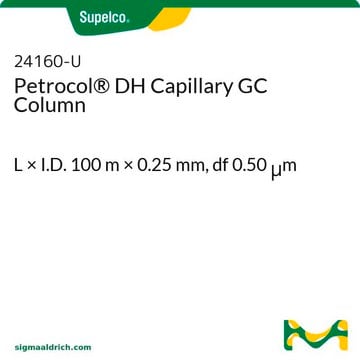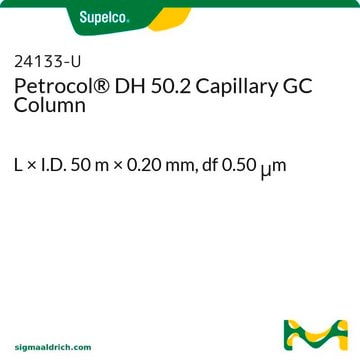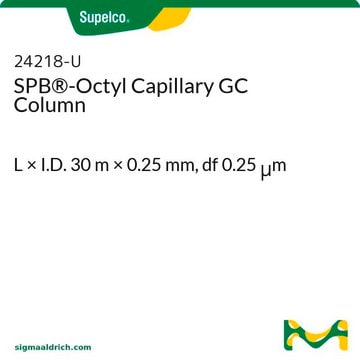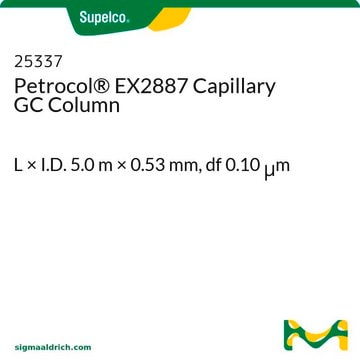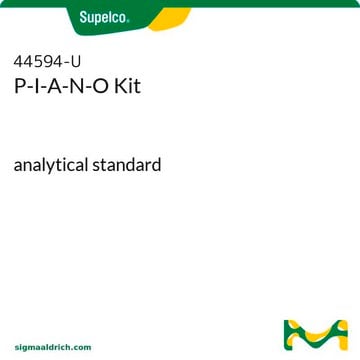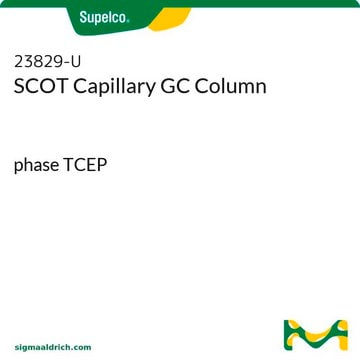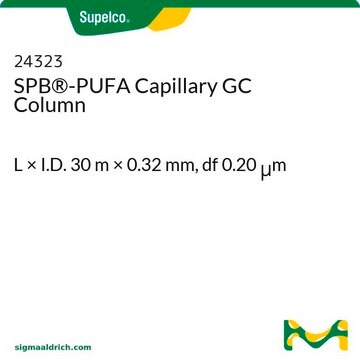24155
Petrocol® DH 150 Capillary GC Column
L × I.D. 150 m × 0.25 mm, df 1.00 μm
Sign Into View Organizational & Contract Pricing
All Photos(1)
About This Item
UNSPSC Code:
41115710
eCl@ss:
32119290
Recommended Products
material
fused silica
Agency
ASTM® D5501,D6729,D6730,D6773
meets requirements for USP G1, G2 and G9
parameter
-60-320 °C temperature (isothermal or programmed)
Beta value
63
df
1.00 μm
technique(s)
gas chromatography (GC): suitable
L × I.D.
150 m × 0.25 mm
matrix active group
Bonded; poly(dimethyl siloxane) phase
application(s)
biofuels
chemicals and industrial polymers
petroleum
column type
capillary non-polar
General description
Application: This long capillary column is designed for detailed purity analyses of light hydrocarbon gases and petroleum products (oxygenates, solvents, naphthas, gasolines, etc.).
USP Code: This column meets USP G1, G2, and G9 requirements.
Phase:
USP Code: This column meets USP G1, G2, and G9 requirements.
Phase:
- Bonded
- Poly(dimethyl siloxane)
- -60 °C to 320 °C (isothermal or programmed)
Application
Petrocol® DH 150 Capillary GC Column has been used for the separation of:
- C10 derivatives obtained from decalin ring opening, using gas chromatography-flame ionization detector (GC-FID) and GC coupled to mass spectrometer detector (GC-MSD).
- Acyclic C5-C7 alkenes from fluid catalytic cracked gasoline using GC-MS.
- Gasoline and fuel oxygenate vapors, as well as alkanes and phenols by GC-FID.
- Refinery isomerate samples by GC.
- Products of polyalkenes thermal cracking using high resolution capillary GC under isothermal and temperature-programmed conditions.
Other Notes
We offer a variety of chromatography accessories including analytical syringes
Legal Information
ASTM is a registered trademark of American Society for Testing and Materials
Petrocol is a registered trademark of Merck KGaA, Darmstadt, Germany
Choose from one of the most recent versions:
Already Own This Product?
Find documentation for the products that you have recently purchased in the Document Library.
Gas chromatographic--mass spectrometric characterization of all acyclic C5-C7 alkenes from fluid catalytic cracked gasoline using polydimethylsiloxane and squalane stationary phases.
Sojak L, et al.
Journal of Chromatography A, 947(1) (2002)
A new non-linear calculation method of isomerisation gasoline research octane number based on gas chromatographic data.
Nikolaou N, et al.
Fuel: The Science and Technology of Fuel and Energy, 83(4-5) (2004)
Gas chromatography with ballistic heating and ultrafast cooling of column.
Krko?ova Z.
Chemical Papers, 62(2) (2008)
Health assessment of gasoline and fuel oxygenate vapors: generation and characterization of test materials.
Henley M, et al.
Regulatory Toxicology and Pharmacology, 70(2) (2014)
High resolution gas chromatographic--mass spectrometric analysis of polyethylene and polypropylene thermal cracking products.
Sojak L, et al.
Journal of Analytical and Applied Pyrolysis, 78(2) (2007)
Chromatograms
suitable for GCsuitable for GCOur team of scientists has experience in all areas of research including Life Science, Material Science, Chemical Synthesis, Chromatography, Analytical and many others.
Contact Technical Service